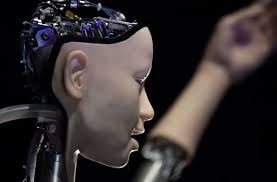Source: techjaja.com/
CC seems to be focusing more on future technologies under the new leadership of Ag. UCC Executive Director Irene Kaggwa Sewankambo . A lot has been said about the likelihood of machines replacing humans and she believes in the Fourth Industrial Revolution, Artificial Intelligence (AI) should complement and enhance rather than replace human capabilities.
Eng. Kaggwa Sewankambo told the 2nd Annual Higher Education Conference organised by the National Council for Higher Education (NCHE) at Hotel Africana on 16 March 2020 that ” You will always require a human touch to take you from where the machine stops.”
Speaking on the topic, “Leveraging Artificial Intelligence to Achieve Sustainable Development Goal 4,” which seeks to promote quality and inclusive education, the Ag. UCC ED said AI must not be seen as an attempt to replace the teacher as human interaction and collaboration between teachers and learners remains critical in the learning process. “AI completes, not substitutes the teaching process,” she said.
The conference, whose stated aim was to “explore ways and means of adequately preparing the Human Capital in Uganda for the 4IR”, was understandably dominated by debate on the Fourth Industrial Revolution (4IR) and how Artificial Intelligence can be harnessed to improve learning.
Describing AI as “the making of intelligent machines that are able to mimic human intelligence while handling tasks that normally a human would perform,” Ms Kaggwa Sewankambo said these technologies present opportunities to empower teaching and teachers, improve learning, and help in education management.
“AI provides support in educational and pedagogical responsibilities, e.g. more efficient, motivational, personalised (to abilities and needs) and contextualised support for students instead of on the ‘one size fits all’ approach,” she explained.
The UCC ED added that AI could also be used in time-consuming tasks such as exam preparation and grading of students so that teachers have more time for innovation and other relevant duties.
She further spoke of AI’s potential to promote lifelong formal and informal learning, as well as personalised, flexible learning and use of assistive technology for vulnerable groups such as older people and Persons with Special Needs (PSNs).
However, Ms Kaggwa Sewankambo was quick to point out that to reap AI benefits, the AI design must inculcate ethics, privacy and security. She added that a balance between data privacy, data ownership and data availability is paramount.
Underscoring the need for good quality data, the Ag. UCC ED argued that formulation of the tasks for AI to work with, collection of the data, and design of algorithms must all be ethical to avoid a “garbage in garbage out” scenario.
On leveraging AI to attain SDG 4, she said it must not be lost on AI users that its rationale is to complement and enhance, rather than to replace human capacities in order to create optimum learning environments.
She said development and use of AI must be “human-controlled and centred on people – ethical, non-discriminatory, equitable, transparent and auditable.”
Opened by the Minister of State for Higher Education J.C. Muyingo and addressed by the Permanent Secretary, Ministry of ICT and National Guidance, Vincent Bagiire, among others, the conference was attended by mostly leaders of higher institutions of learning, researchers, as well as private and public sector institutions associated with education.
Various speakers painted the picture of the future with AI in full flow, including Dr Andrew Katumba of Makerere University who amused the audience with his illustration of a kettle connected to the Internet in his presentation on the Internet of Things (IoT).
Despite science and technology dominating the day’s discussion, several presenters, including Ms Kaggwa Sewankambo, and Makerere University Vice Chancellor Barnabas Nawangwe pointed out that the Fourth Industrial Revolution needs humanities just as it needs scientists if its transformative potential is to be realised.


